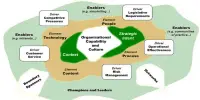Indigenous planning (or Indigenous community planning) is an ideological approach to regional planning in which planning is done by Indigenous peoples for Indigenous communities. It refers to the process of designing and implementing plans and strategies that are culturally sensitive, respectful of Indigenous knowledge and values, and tailored to satisfy the unique needs and aspirations of Indigenous communities. It affirms the value of self-determination, autonomy, and sovereignty for Indigenous peoples in making decisions regarding their lands, resources, and future development.
Practitioners include traditional or cultural knowledge in the planning process. Indigenous planning acknowledges that “all human communities plan” and that Indigenous people have been conducting their own community planning procedures for thousands of years. While the necessity to collaborate with indigenous peoples and organizations is included in the broader framework of urban planning and social planning, the method of doing so is based on social, political, and cultural dynamics.
Here are some key aspects and principles of Indigenous planning:
- Cultural Respect: It begins with a strong regard for the Indigenous community’s culture, customs, and knowledge systems. It recognizes Indigenous peoples’ special relationship with their land and natural resources.
- Self-Determination: It acknowledges Indigenous groups’ right to make decisions regarding their own development, land usage, and government. It entails engaging and including Indigenous community members in the planning process.
- Holistic Approach: It frequently takes a comprehensive approach, taking into account not just economic and physical development, but also social, cultural, and environmental factors. It seeks to strike a balance between community well-being and the preservation of traditional values and natural resources.
- Community-Based: Indigenous planning is community-centric, meaning that plans are developed with input and consensus from the local Indigenous community. It often involves Elders, knowledge keepers, and traditional leaders in decision-making processes.
- Sustainability: Indigenous planning often emphasizes sustainability and long-term thinking. It seeks to ensure that development activities do not harm the environment or deplete natural resources, ensuring that future generations can benefit from the land.
- Land Stewardship: Indigenous planning acknowledges Indigenous peoples as stewards of the land. It often incorporates traditional land management practices and Indigenous ecological knowledge to promote responsible land use and conservation.
- Cultural Heritage Preservation: Indigenous planning aims to preserve and revitalize cultural heritage, including language, art, rituals, and traditional practices. It recognizes that cultural continuity is vital for the well-being of Indigenous communities.
Indigenous planning plans and techniques are frequently flexible to shifting circumstances and evolving community requirements. They may be evaluated and altered throughout time to ensure their relevance and effectiveness. Because there are so many Indigenous cultures, traditions and planning differ widely within Indigenous groups.
Indigenous planning is critical for improving Indigenous communities’ well-being and self-determination while respecting their distinct cultural and environmental circumstances. It aims to empower Indigenous peoples to choose their own destinies while still keeping them connected to their ancestral territories.
















